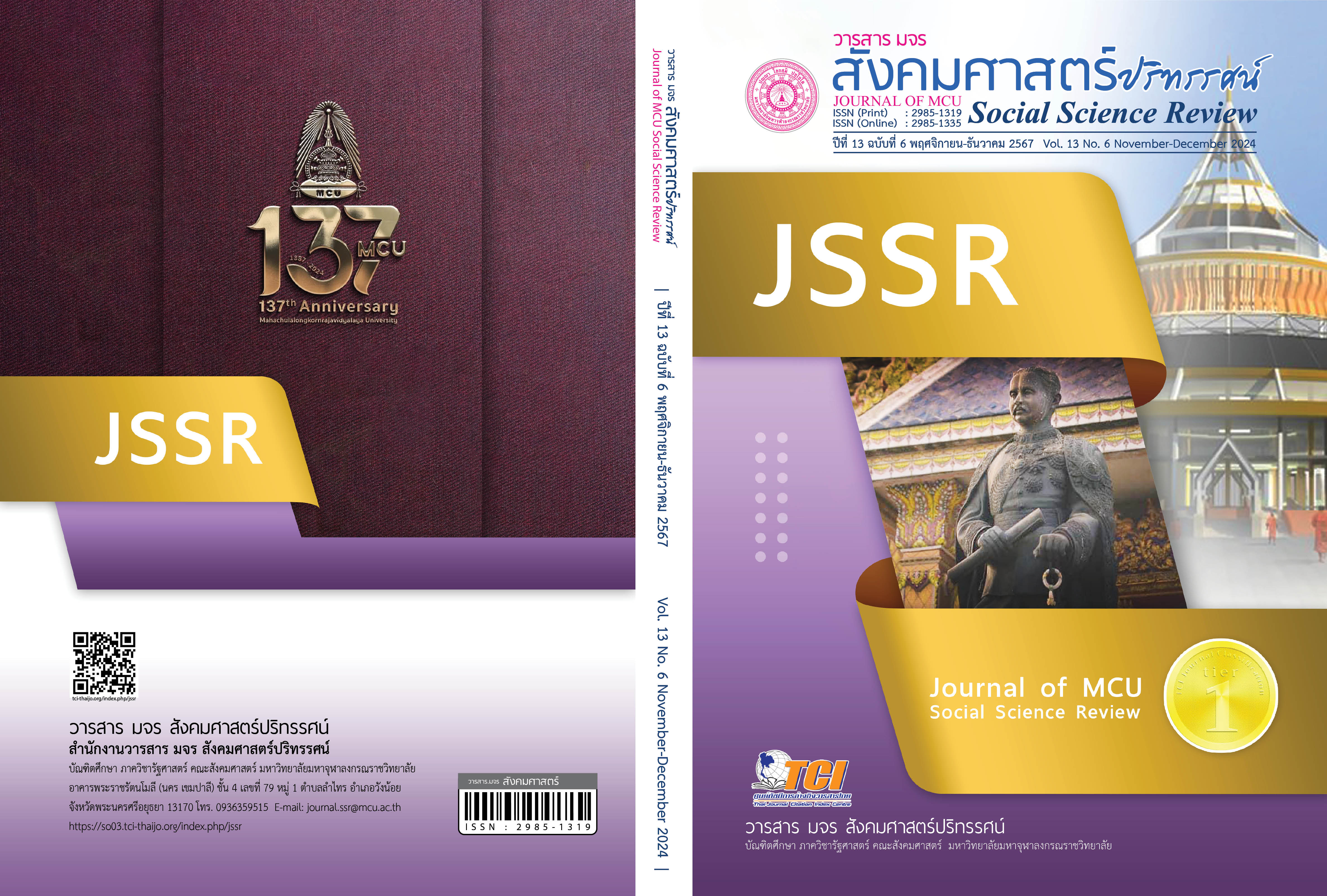กลยุทธ์การพัฒนานักศึกษาสู่การเป็นผู้ประกอบการใหม่ ของสถาบันการเรียนรู้เพื่อปวงชน
คำสำคัญ:
การพัฒนารูปแบบ, การบริหารโรงเรียนคุณธรรม, โรงเรียนคุณธรรมยุคใหม่บทคัดย่อ
บทความวิจัยนี้มีวัตถุประสงค์ 1. ศึกษาปัญหาการพัฒนานักศึกษาสู่การเป็นผู้ประกอบการใหม่ของสถาบันการเรียนรู้เพื่อปวงชน 2. กำหนดกลยุทธ์การพัฒนานักศึกษาสู่การเป็นผู้ประกอบการใหม่ของสถาบันการเรียนรู้เพื่อปวงชน ทดลองและประเมินกลยุทธ์การพัฒนานักศึกษาสู่การเป็นผู้ประกอบการใหม่ของสถาบันการเรียนรู้เพื่อปวงชน เป็นการวิจัยแบบผสมผสาน วิจัยเชิงคุณภาพและเชิงปริมาณ แบ่งออกเป็น 3 ระยะ ดังนี้ ระยะที่ 1 ศึกษาปัญหาการพัฒนานักศึกษาให้เป็นผู้ประกอบการรายใหม่ กลุ่มตัวอย่างเป็นนักศึกษา จำนวน 276 คน ระยะที่ 2 ร่างกลยุทธ์การพัฒนานักศึกษาสู่การเป็นผู้ประกอบการใหม่ ดำเนินการจัดประชุมเชิงปฏิบัติการกับกลุ่มผู้ทรงคุณวุฒิ จำนวน 21 คน ระยะที่ 3 การทดลองกลยุทธ์การพัฒนานักศึกษาสู่การเป็นผู้ประกอบการใหม่ กลุ่มเป้าหมาย 30 คน เครื่องมือที่ใช้ในการวิจัย ได้แก่ แบบสอบถาม แบบประเมินความเหมาะสมและความเป็นไปได้ แบบทดสอบก่อนและหลังการทดลอง และแบบประเมินความพึงพอใจ วิเคราะห์ข้อมูลโดยการวิเคราะห์เนื้อหา ความถี่ ค่าร้อยละ ค่าเฉลี่ย ส่วนเบี่ยงเบนมาตรฐาน และการทดสอบค่าที
ผลการวิจัยพบว่า 1. ปัญหาการพัฒนานักศึกษาสู่การเป็นผู้ประกอบการใหม่ พบว่า ภาพรวมอยู่ในระดับปานกลาง 2. กลยุทธ์การพัฒนานักศึกษาสู่การเป็นผู้ประกอบการใหม่ ประกอบด้วย 1 วิสัยทัศน์ 4 พันธกิจ 4 เป้าประสงค์ 2 ตัวชี้วัดระดับกลยุทธ์ 4 กลยุทธ์การพัฒนา ผลการประเมินความเหมาะสมและความเป็นไปได้ของกลยุทธ์ ผ่านเกณฑ์การประเมินที่มีค่าเฉลี่ยตั้งแต่ 3.51 ขึ้นไปทุกด้าน 3. ผลการทดลองและประเมินการใช้กลยุทธ์การพัฒนานักศึกษาสู่การเป็นผู้ประกอบการใหม่ กลุ่มนักศึกษาที่เข้าร่วมทดลองได้ทำแบบทดสอบก่อนและหลังการทดลอง ซึ่งผลคะแนนของแบบ ทดสอบด้านความรู้เพิ่มขึ้นทุกคน ส่วนผลการประเมินความพึงพอใจกิจกรรม พบว่า โดยภาพรวมอยู่ในระดับมาก
เอกสารอ้างอิง
จรรจิรา ดาราชาติ. (2561). แนวทางการพัฒนาสมรรถนะนักศึกษาสาขาวิชาการโรงแรมของสถานศึกษาอาชีวศึกษาภูเก็ต ตามกรอบคุณวุฒิวิชาชีพเพื่อตอบสนองความคาดหวังของสถานประกอบการ. วารสารวิจัยและพัฒนา มหาวิทยาลัยราชภัฏเลย, 13(45), 21-32.
จุฑามาส ศรีทองคำ และกัญญ์รัชการย์ เลิศอมรศักดิ์. (2564). การบริหารงานศูนย์บ่มเพาะ ผู้ประกอบการอาชีวศึกษาสู่ความเป็นเลิศในเขตกรุงเทพมหานคร. วารสารมหาวิทยาลัยราชภัฏลำปาง, 10(2), 35-45.
ฉันท์หทัย อาจอ่ำ และคณะ. (2561). การวิเคราะห์จุดแข็ง จุดอ่อน โอกาส และอุปสรรค (SWOT) และข้อเสนอเชิงกลยุทธ์เพื่อการจัดการศึกษาทางเลือกของสถาบันการเรียนรู้เพื่อปวงชน. กรุงเทพฯ: มหาวิทยาลัยมหิดล.
ชลลดา เจียมจิตวานิชย์ และคณะ. (2564). ตัวแบบการเป็นผู้ประกอบการใหม่ของนักศึกษาปริญญาตรีสังกัดมหาวิทยาลัยในเขตกรุงเทพมหานครและปริมณฑล. วารสารวิชาการ สถาบันเทคโนโลยีแห่งสุวรรณภูมิ, 7(1), 433-447.
ธนิกานต์ ศรีจันทร์ และเสาวลักษณ์ โกศลกิตติอัมพร. (2566). ยุทธศาสตร์ชาติ 20 ปี กับการพัฒนาประเทศไทย. วารสารศูนย์พัฒนาการเรียนรู้สมัยใหม่, 8(1), 413-435.
นริศรา ทองยศ. (2565). แนวทางการพัฒนาความเป็นผู้ประกอบการใหม่ของนักศึกษา วิทยาลัยอาชีวศึกษา. วารสารวิชาการธรรมทรรศน์, 22(3), 281-291.
บงกชรัตน์ ธูปกระแจะ และคณะ. (2564). ปัจจัยแห่งความสำเร็จของผู้ประกอบการที่เข้ารับการบ่มเพาะในโครงการหน่วยบ่มเพาะวิสาหกิจในสถาบันอุดมศึกษา ปีงบประมาณ 2562-2563. วารสารการบริหารการปกครองและนวัตกรรมท้องถิ่น, 5(1), 155-172.
บุญชม ศรีสะอาด. (2556). การวิจัยเบื้องต้น (พิมพ์ครั้งที่ 9). กรุงเทพฯ: สุวีริยาสาส์น.
ลัลนา วงษ์ประเสริฐ และคณะ. (2563). คุณลักษณะผู้ประกอบการเชิงนวัตกรรมของนักศึกษาสายอาชีวะตามแนวทางประเทศไทย 4.0. วารสารสังคมศาสตร์บูรณาการมหาวิทยาลัยมหิดล, 7(2), 17-32.
สำนักงานเลขาธิการสภาการศึกษา. (2561). รายงานวิจัยการจัดการศึกษาเพื่อพัฒนาความเป็นผู้ประกอบการ. กรุงเทพฯ: สำนักงานเลขาธิการสภาการศึกษา.
เสรี พงศ์พิศ. (2554). มหาวิทยาลัยชีวิต: แรงบันดาลใจ. สืบค้น 18 มีนาคม 2565, จาก https://www.gotoknow.org/posts/445241#googlevignette
Almahdi, H. (2015). Promoting Entrepreneurs and Economic Growth Through Entrepreneurship Programmes: A New Role of Saudi Universities. Retrieved March 23, 2022, from https:// bura. brunel.ac.uk/bitstream/2438/13815/1/ FulltextThesis.pdf
Cronbach, L. J. (1970). Essentials of Psychological Testing (3rd ed). New York: Harper & Row.
Krejcie, R. V. & Morgan, D. W. (1970). Determining Sample Size for Research Activities. Journal of Educational and Psychological Measurement, 30(3), 607-610.
Mbeteh, A. (2019). Development of a competency framework for Entrepreneurship Education Programmes in Sierra Leone. Retrieved March 18, 2022, from https://repository.uwl.ac.uk/id/eprint/7900/
ดาวน์โหลด
เผยแพร่แล้ว
รูปแบบการอ้างอิง
ฉบับ
ประเภทบทความ
สัญญาอนุญาต
ลิขสิทธิ์ (c) 2024 วารสาร มจร สังคมศาสตร์ปริทรรศน์

อนุญาตภายใต้เงื่อนไข Creative Commons Attribution-NonCommercial-NoDerivatives 4.0 International License.
เพื่อให้เป็นไปตามกฎหมายลิขสิทธิ์ ผู้นิพนธ์ทุกท่านต้องลงลายมือชื่อในแบบฟอร์มใบมอบลิขสิทธิ์บทความให้แก่วารสารฯ พร้อมกับบทความต้นฉบับที่ได้แก้ไขครั้งสุดท้าย นอกจากนี้ ผู้นิพนธ์ทุกท่านต้องยืนยันว่าบทความต้นฉบับที่ส่งมาตีพิมพ์นั้น ได้ส่งมาตีพิมพ์เฉพาะในวารสาร มจร สังคมศาสตร์ปริทรรศน์ เพียงแห่งเดียวเท่านั้น หากมีการใช้ภาพหรือตารางหรือเนื้อหาอื่นๆ ของผู้นิพนธ์อื่นที่ปรากฏในสิ่งตีพิมพ์อื่นมาแล้ว ผู้นิพนธ์ต้องขออนุญาตเจ้าของลิขสิทธิ์ก่อน พร้อมทั้งแสดงหนังสือที่ได้รับการยินยอมต่อบรรณาธิการ ก่อนที่บทความจะได้รับการตีพิมพ์ หากไม่เป็นไปตามข้อกำหนดเบื้องต้น ทางวารสารจะถอดบทความของท่านออกโดยไม่มีข้อยกเว้นใดๆ ทั้งสิ้น





